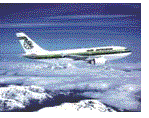|
|
|
|
|

Air
Afrique: A Bridge to Africa from North America
 Ask
about new low fares to West Africa Ask
about new low fares to West Africa
Shortly after
achieving political independence,
the heads of
state of 11 Central and Western African nations met in
Yaounde, Cameroon. The date was March 28, 1961, and their
purpose was to initiate joint action toward the common goals
transcending the artificial barriers left over from the
Colonial era, and thus achieve a more meaningful and
complete form of independence. Transportation was on the top
of their agenda because, at that time, intra-African air
transportation was a very rudimentary
stage.
One had to rely
on foreign carriers transiting via Europe to travel from one
African state to another. The Yaounde summit, therefore,
produced the historic decision to create an African airline
owned and operated by the member states. The airlines was
commissioned to develop better links among African nations,
thereby promoting the images of Africa worldwide and
reinforcing the concept of African unity.
Travel
links to.
Thus was born Air Afrique, an
experiment in multi- national cooperation. The challenges
facing the new company were rather formidable. In fact, it
is hard to believe today, as the regular and wide bodied
jets of Air Afrique carry the now-familiar green colors and
horse-antelope logo of the airline to some 30 countries on 5
continents (Africa, Europe, Asia Minor, North and South
America) , that this international carrier actually began
operations in the early 60s with a team of only eight
employees housed in makeshift quarters in downtown Abidjan,
flying piston aircraft borrowed from other airlines. But
what they lacked in resources, the pioneers of Air Afrique
made up in enthusiasm, foresight and determination.
Exploiting the extensive air traffic rights of its member
nations was but part of the new company's mission -- it also
had to make sure the continent's travel infrastructures were
up to international standards. Hotel
development follows: Air Afrique
became a catalyst in the development of hotels throughout
West and Central Africa, through its own subsidiary,
Hotafric, which eventually ceased functioning as major
international hotel chains picked up the great challenge.Air
Afrique developed, and still manages, a number of game
fishing centers, hunting camps and birds sanctuaries, making
the wildlife wonders of Africa more easily accessible.
Instrumental in promoting incoming tourism, Air Afrique
created a variety of tour itineraries throughout Africa,
which it distributed to tour operators and travel agents in
Europe and the U.S.A.
Finally, in order to fulfill its
mission as a competitive international carrier, Air Afrique
undertook the responsibility to train, over the years, its
own administrative, commercial and technical personnel in
collaboration with major aeronautical schools overseas and
through its own training centers in Dakar, and Abidjan.
Today, Air Afrique employs over 5,000 persons (over 90%
African). With a modern jet fleet made up of DC10s and
Airbuses, and a worldwide network linked through the
technologically advanced Alpha III satellite reservation
system including such other US facilities offered by PARS.
Apollo/ Covia, Sabre, and System One. Air Afrique has gained
recognition as one of the world's major carriers. The young
member nations of Africa can be justly proud of this joint
effort. Together, they have written one of the success
stories of modern aviation. In real economic terms, the
fruits of this success story are indeed beginning to roll
for Air Afrique -- reflecting on the complex and acutely
competitive US market.
Africa Travel Magazine is pleased to
include excerpts and images from Air Afrique and its
excellent in-flight review, Balafon... a promotional
tool that's designed to familiarize the traveling public
with the mysteries of the continent
|


 Ask
about new low fares to West Africa
Ask
about new low fares to West Africa